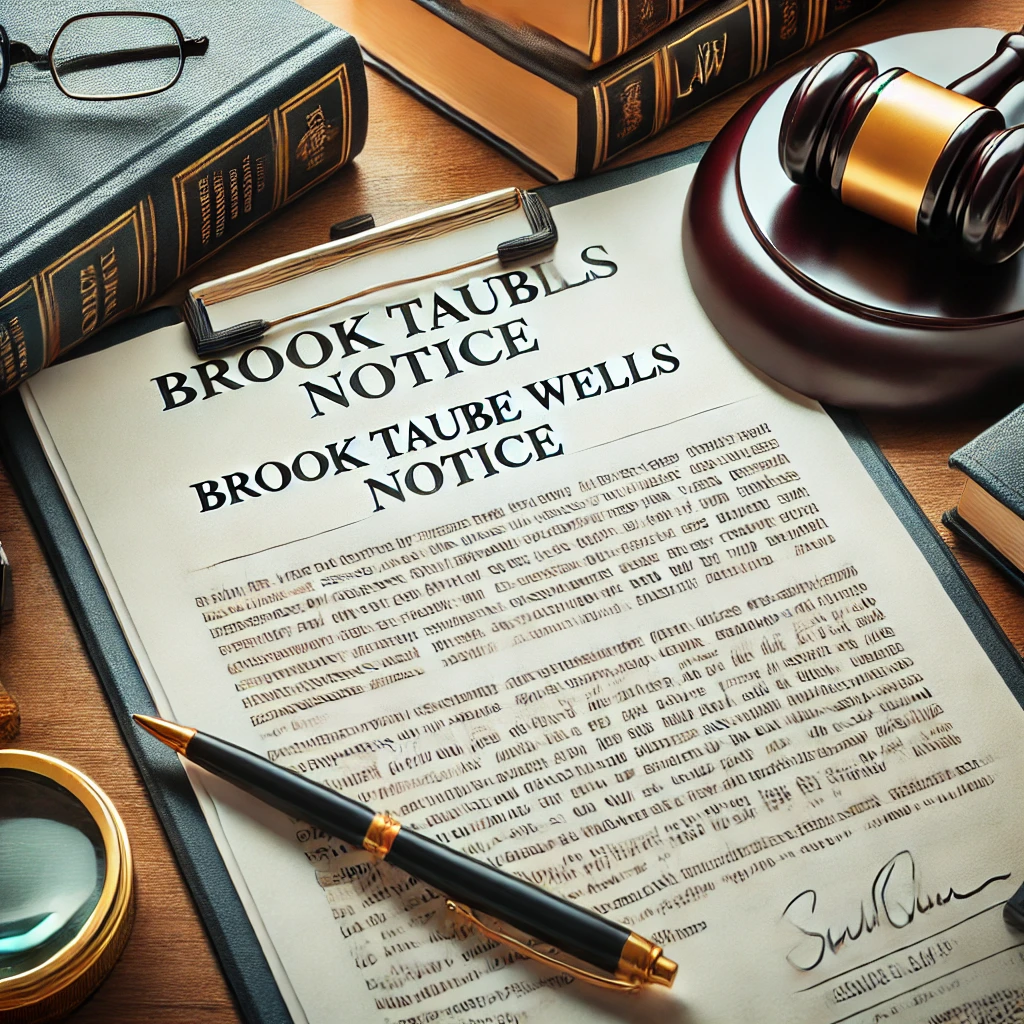
Understanding Brook Taube Wells Notice: What It Means and How It Affects Legal Matters
A Brook Taube Wells Notice is a critical aspect of U.S. securities law, particularly in the context of corporate compliance and shareholder rights. For anyone involved in corporate governance, investor relations, or securities law, understanding what a Brook Taube Wells Notice is, how it functions, and its implications for legal matters is essential. This article will provide an in-depth exploration of the Brook Taube Wells Notice, detailing its significance, how it affects companies and individuals, and its role in various legal proceedings.

Table of Contents
What is a Brook Taube Wells Notice?
The term “Brook Taube Wells Notice” is not widely recognized outside of specialized legal circles, but it holds significant weight in securities law. Named after a combination of legal principles, the Wells Notice is generally tied to the Wells Procedure, which refers to a formal notification issued by regulatory bodies, such as the Securities and Exchange Commission (SEC). The notice is issued to individuals or organizations under investigation for potential violations of securities laws.
The Brook Taube Wells Notice is a specific extension of this procedure and can carry implications for both the legal landscape and the individuals involved. Understanding its function and how it affects parties under investigation is crucial for companies, executives, and legal professionals.
The Significance of a Wells Notice in Legal Matters
Before diving into the specifics of the Brook Taube Wells Notice, it’s important to first understand the general Wells Notice framework. A Wells Notice is issued after an investigation by the SEC or other regulatory agencies indicates that there may have been violations of securities law. The notice essentially informs the recipient that the agency has enough evidence to pursue enforcement action against them unless they can provide convincing evidence to the contrary.
The Wells Notice procedure serves as a mechanism for individuals or companies to avoid penalties or further legal action by offering them the chance to argue their case before formal charges are filed. This can include presenting legal defenses, offering mitigating factors, or showing that the evidence isn’t sufficient to warrant an enforcement action.
How Does a Brook Taube Wells Notice Differ from a Standard Wells Notice?
A standard Wells Notice typically signals that the SEC has enough evidence to file charges but provides the recipient an opportunity to avoid litigation. However, the Brook Taube Wells Notice introduces additional complexities, especially when it comes to certain types of corporate violations. It may have broader implications for the company or individual involved, especially in cases where corporate governance issues or larger systemic violations are at play.
For example, the Brook Taube Wells Notice may be employed when there are allegations related to insider trading, securities fraud, or misstatements in financial reporting. It may focus more heavily on the executive leadership, corporate officers, or large institutional stakeholders. Understanding the potential consequences of receiving this notice can influence how legal teams prepare for defense or settlement negotiations.
Key Legal Implications of the Brook Taube Wells Notice
The receipt of a Brook Taube Wells Notice can have several legal ramifications. Here are some of the key legal matters it may affect:
- Potential SEC Enforcement Actions: As with any Wells Notice, the primary implication is the potential for enforcement action from the SEC. This could include civil penalties, disgorgement of profits, or injunctions to prevent further violations.
- Corporate Reputation: The issuance of a Brook Taube Wells Notice can harm a company’s reputation, especially if it is made public. This could result in a loss of investor confidence, stock price declines, and diminished corporate goodwill.
- Litigation and Legal Fees: Companies or individuals who receive a Brook Taube Wells Notice will likely need to engage in legal defense proceedings, which can be costly and time-consuming. A robust legal strategy may include negotiations with the SEC or attempts to resolve the matter before formal litigation.
- Impact on Executive Leadership: A Brook Taube Wells Notice can also have significant consequences for executives and company leaders. If allegations of wrongdoing are proven, it could result in personal liability, fines, or even criminal charges.
How to Respond to a Brook Taube Wells Notice
If you or your company receives a Brook Taube Wells Notice, it’s important to respond promptly and carefully. Here are the recommended steps to take when faced with such a notice:
1. Hire an Experienced Securities Attorney
A skilled attorney specializing in securities law should be your first point of contact. They will be able to interpret the details of the notice, assess the strength of the evidence, and guide you on the best course of action.
2. Review the Allegations
The next step is to thoroughly review the allegations made against you or your company. Determine the validity of the claims and whether there are any grounds for defense or mitigating factors that could reduce potential penalties.
3. Prepare a Wells Submission
In some cases, a Wells Submission may be appropriate. This is a formal presentation made to the SEC in response to the notice, offering evidence or arguments to counter the allegations. It’s an opportunity to present your side of the story before formal charges are filed.
4. Consider Settlement Options
In some situations, the SEC may be open to settling the case before it goes to trial. If a settlement is possible, it may result in reduced penalties or the avoidance of prolonged litigation.
The Role of Brook Taube Wells Notice in Corporate Governance
In the realm of corporate governance, the Brook Taube Wells Notice plays a critical role in ensuring transparency and compliance with securities laws. Companies must maintain strict internal controls, conduct regular audits, and ensure that financial reporting is accurate to avoid running afoul of these legal provisions. A notice issued in this context can act as a wake-up call for executives and boards of directors to reevaluate their practices and make necessary changes to avoid future violations.
Common Legal Violations Leading to a Brook Taube Wells Notice
While the Brook Taube Wells Notice can apply to a wide range of securities law violations, here are some of the most common reasons why this notice might be issued:
- Insider Trading: Trading securities based on non-public information can lead to significant regulatory scrutiny. The SEC often pursues individuals and companies involved in insider trading.
- Securities Fraud: Misrepresenting material information in securities filings or misleading investors can lead to civil penalties or criminal charges.
- Accounting Irregularities: Companies that fail to comply with accounting standards or engage in deceptive financial reporting may be subject to a Wells Notice.
- Market Manipulation: Engaging in practices that artificially inflate or deflate stock prices may result in SEC action.
The Impact of a Brook Taube Wells Notice on Investors and Shareholders
For investors and shareholders, a Brook Taube Wells Notice can signal potential risks that may impact the company’s financial health and long-term stability. A notice issued against a company could lead to significant legal battles, fines, or changes in executive leadership. This can affect stock prices, dividends, and overall market perception of the company.
FAQs
- What is the purpose of a Brook Taube Wells Notice? A Brook Taube Wells Notice is issued to inform an individual or company that regulatory authorities have evidence of potential violations of securities law.
- How does a Wells Notice differ from a Brook Taube Wells Notice? While both are related to securities law violations, the Brook Taube Wells Notice often deals with more complex or large-scale corporate violations.
- What happens if you ignore a Brook Taube Wells Notice? Ignoring a Wells Notice can lead to formal enforcement actions, penalties, or even litigation.
- Can I avoid legal penalties after receiving a Wells Notice? Yes, by presenting a strong defense, offering mitigating evidence, or reaching a settlement, you may avoid or reduce legal penalties.
- Should I hire an attorney if I receive a Brook Taube Wells Notice? Yes, consulting with an experienced securities attorney is crucial to navigating the response process and minimizing legal consequences.
- Is a Wells Notice the same as being charged with a crime? No, a Wells Notice is not a charge but rather an indication that the SEC is considering taking enforcement action.
- How long do I have to respond to a Brook Taube Wells Notice? Typically, you will have a limited time frame to respond, often 30 days, although this can vary depending on the specifics of the case.
- What are the potential consequences of receiving a Brook Taube Wells Notice? The consequences can include fines, legal penalties, and reputational damage to individuals or companies.
- Can a Wells Notice be challenged? Yes, the recipient can present a Wells Submission to challenge the allegations and provide evidence in their defense.
- What is the Wells Procedure? The Wells Procedure is the formal process through which individuals or companies can respond to a Wells Notice by offering a defense before formal enforcement actions are taken.
- How does a Brook Taube Wells Notice affect executive leadership? Executives named in a Brook Taube Wells Notice may face personal liability, including fines and potential criminal charges.
- What should I do if my company receives a Brook Taube Wells Notice? It’s important to consult with legal counsel immediately to assess the situation and prepare an appropriate response.
Conclusion
Understanding the Brook Taube Wells Notice and its implications for legal matters is essential for any company or individual involved in securities law. Whether you’re facing a notice or simply want to ensure compliance with the law, being informed and prepared can make all the difference in navigating the complex world of regulatory enforcement. By responding strategically and with expert legal guidance, you can protect your interests and avoid the significant consequences of non-compliance.
